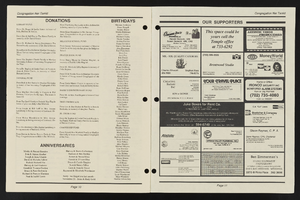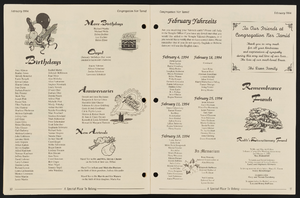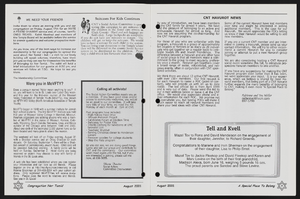Search the Special Collections and Archives Portal
Search Results

Preprint, Where I Stand: The Record of a Reckless Man, by Hank Greenspun with Alex Pelle, 1966
Date
Archival Collection
Description
Book proof with annotations from editors in the margins.
Text

Transcript of interview with Edward "Ed" Butera by Stefani Evans and Claytee White, July 28, 2016
Date
Archival Collection
Description
Engineer Edward "Ed" Butera spent hours constructing models from the time he was a five-year-old boy in San Jose, California. Besides his interest in building and design, the young Butera also loved math and music—specifically the clarinet, at which he excelled, and which he still enjoys. After earning his Bachelor’s degree in Electrical Engineering at San Jose State University he was hired by Ralph Joeckel as a consulting engineer for Trane, a heating and air conditioning company. Joeckel became a mentor and "second dad" to Butera after the company sent him to Las Vegas in 1972, and the two remain close to this day. In this interview, Butera shares how he engineered and designed power, water, sanitation, utilities, and heating and cooling systems on many Clark County high schools, hospitals, and data centers while considering such factors as the building's shape and its affect on the way wind forces act on its glass, windows, and doors. He talks of his casino work that began with the Stardust soon after he arrived in Las Vegas, and before his client list grew to include Tony Marnell, Steve Wynn, and MGM. Besides the hotels, he shares his experiences engineering the infrastructure for the Bellagio fountains, The Mirage volcano, Treasure Island's pirate show.
Text

Harold McKay interview, March 13, 1981: transcript
Date
Archival Collection
Description
On March 13, 1981, Dana Jamerson interviewed Harold McKay (b. July 27th, 1903 in Dresden, Kansas) about his life as a teacher in Las Vegas, Nevada. McKay speaks about his education, his move from Chicago, Illinois to Las Vegas and how he began his career in education. McKay focuses on how and why he founded the Teacher’s Credit Union, his time working in administration and his business school, as well as the problems related to segregation and integration in the educational system. Lastly, he talks about the growth of the gaming and entertainment industry in Las Vegas, and his volunteer work with the Senior Citizen Center.
Text

Transcript of interview with Frankie Perez by Elsa Lopez and Laurents Bañuelos-Benitez, November 5, 2018
Date
Archival Collection
Description
Frankie Perez (1986- ) is an individual that constantly found himself navigating two worlds, whether it was military versus civilian; female versus male; or being Latinx in the United States. As a result of this navigation, Perez has a unique perspective on our ever more complicated world that not many individuals possess. Perez served in the military during the Do Not Ask, Do Not Tell policy which made it difficult for someone dealing with gender identity, to seek out the proper support they need. Despite the policy, and other policies that were put in place afterwards to inhibit the transgender community in the military, Perez began his transition while still serving his country. In direct contradiction of popular opinion, Perez discovered that the military easily accommodated his transition. Outside of the military Perez is an active voice in the LGBTQ community. As a member of the LGBTQ, Latinx, and military community, Perez has a unique perspective that he uses to fight for both LGBTQ and Latinx rights. Currently, Perez is finishing his degree in gender and sexuality studies at UNLV. He hopes to use his education to help people have the difficult discussions and improve conditions for his communities.
Text






